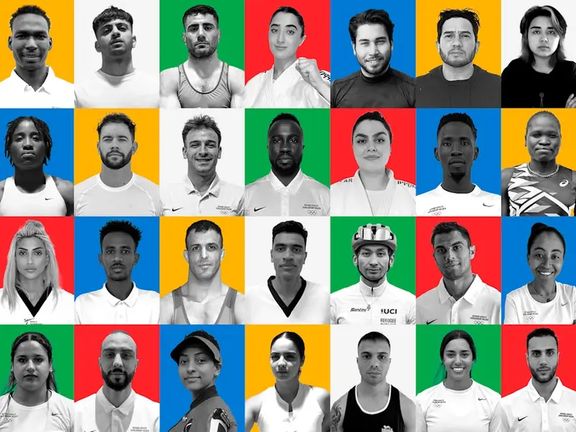Iran calls for barring Israel from Olympics ignoring own crisis with athletes

While Iran calls to ban Israel from the Olympic Games over the war in Gaza, 14 Iranian athletes will compete under the Olympic Committee's Refugee Team.

While Iran calls to ban Israel from the Olympic Games over the war in Gaza, 14 Iranian athletes will compete under the Olympic Committee's Refugee Team.
“Iran condemns the reception and protection of Israeli athletes at the Olympic Games in Paris, demanding their exclusion over Israel’s war against Hamas in Gaza. Announcing the reception and protection of the apartheid terrorist Zionist regime’s delegation means giving legitimacy to the child killers,” Iran’s foreign ministry stated in a post on X on Tuesday.
The foreign ministry statement said Israel does "not deserve to be present at the Paris Olympics because of the war against the innocent people of Gaza,” calling on organizers to ban Iran's archenemy.
On Thursday, Israel's foreign minister warned his French counterpart of a potential Iranian-backed plot to target Israeli athletes and tourists during the Paris Olympic Games.
"We currently have assessments regarding the potential threat posed by Iranian terrorist proxies and other terrorist organisations who aim to carry out attacks against members of the Israeli delegation and Israeli tourists during the Olympics," Israel Katz told Stephane Sejourne.
Katz did not detail any specific intelligence or threat against the Games.
On July 26, the flags of 206 countries will be paraded by athletes at the opening ceremony in the Stade de France, including Iran. The Refugee Team, bearing the flag of the International Olympic Committee, will be represented by 14 Iranians who have fled the country. The team has 37 athletes from 11 countries. They will represent sports such as taekwondo, canoe slalom, badminton and wrestling.
The numbers of athletes fleeing Iran have continued to spiral since the 2022 Women, Life, Freedom uprising and after the death of Mahsa Amini in police custody with athletes publicly taking the stage to oppose the government's oppression. Men and women from a range of sports have sought a life in exile, meaning competing under other flags.
Badminton player Dorsa Yavarifar, one of the youngest athletes on the Refugee Team, left Iran in 2018, just 15 at the time. Along with her mother, they left Tehran for Turkey using fake German passports.
She told Reuters she had been consistently rejected by the national badminton team without any given reason.
Shirin Shirzad, the former caretaker of Iran’s Women National Wrestling Team, told Iran International: “More than any other ministry in Iran, we witness mismanagement in the Sports Ministry, and that’s why many Iranian athletes whose big wish is to win medals in the Olympics or world competitions are leaving the country in clusters."
She said the federations lack experienced managers to help cultivate talent on the global stage. "An athlete sacrifices all his or her life to win a medal and when they see their efforts do not result in any advancement in personal life, they are forced to choose a better place to live," she added.

"I was really scared because I didn't know what was going to happen to me," said Yavarifar, who recently turned 21.
"I didn't know where I was going. My mum just said we were going to go to another country, but she never told me how or where," she noted. "It was all worth it. Now, that I think back about it—all that suffering is over, so I'm really happy now."

She is studying sports and exercise science at Middlesex University in London and trains three times a week at the Sankey Academy, an independent badminton club in Milton Keynes.
Saeedeh Fat’hi, an Iranian journalist, also told Iran International that sport is not a priority for Iranian officials who "want to misuse the achievements of the athletes to export the ideology of the Islamic Republic to other countries".
"When the Supreme Leader expresses gratitude to the woman who bore the flag of Iran wearing Hijab or the one who refused to shake hands with men in competitions, it shows how the Iranian government’s view of sports is,” she stressed.
Among the other Iranian athletes on the Refugee Team are Omid Ahmadi-Safa, a boxer who sought asylum in Germany and will compete in the 51 kg boxing category. Amir Rezanejad and Saeed Fazlouli, both refugees in Germany, along with Saman Soltani, a refugee in Austria, will represent Iranian rowing at the Paris Olympics.
Additionally, Mohammad Rashnonejad, a refugee in the Netherlands, and Mahboubeh Barbari Zharfi, a refugee in Germany, are the two Iranian judo athletes on the judo squad.
The Iranian national taekwondo team has four representatives in the Olympics, while the refugee taekwondo team includes three Iranians, making it likely they may come up against former team mates.
The wave of defections follows at least 30 Iranian athletes seeking asylum in recent years, escaping not only political repression in Iran but also specific challenges within the sports sector.
Athletes have cited issues such as corruption within sports federations, the enforced policy of not competing against Israeli athletes, and for women, the mandatory wearing of the hijab during competitions.
The Islamic Republic’s prohibition against its Olympic athletes competing against Israelis originates from its longstanding enmity toward the country since 1979.
Athletes are often pressured by government-controlled sports federation officials to intentionally lose matches or forfeit. Others, like judoka Leila Hosseini, have been told to cite injuries to avoid competing against Israeli opponents. For Hosseini, it cost her a gold medal in Tbilisi.
This year marks the third appearance of the refugee team in the Olympic Games, which began with a small team of 10 athletes in the 2016 Rio Olympics, growing to 29 in the 2020 Tokyo Olympics, and now reaching 37 athletes in the 2024 Paris Summer Olympics.
War-torn Syria and Afghanistan each have five athletes, sharing the second place after Iran. This means that each of these two countries, whose people are under the pressure of the Taliban and Bashar al-Assad, have about one-third of Iran's share in the Refugee Team. While Iran condemns the inclusion of Israeli athletes, it remains silent on the plight of its own refugees.